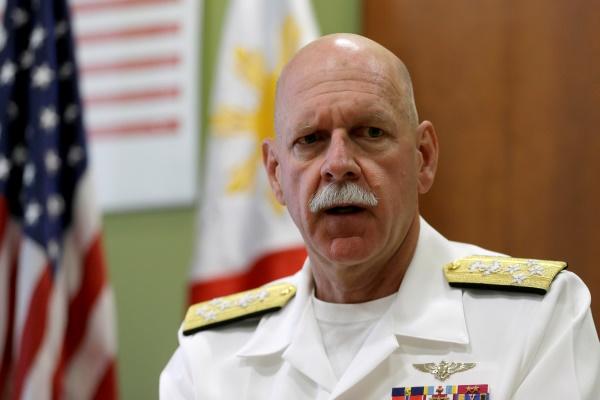A newly released investigation into the Navy's four-star commander of U.S. Pacific Fleet clears him of discriminatory action regarding a subordinate, but advises corrective action regarding an error made in an officer's fitness report.
The investigation highlights the scrutiny under which senior military officers operate and the standards they must uphold.
The Defense Department Inspector General this week released a 2014 investigation into Adm. Scott Swift, the head of U.S. Pacific Fleet who was then the three-star commander of the 7th Fleet. The 17-page investigation was begun when an unnamed sailor filed a complaint claiming that a non-judicial punishment, or NJP, the officer had received was unjust because it was "biased" and based upon "falsified statements," according to the document.
The complainant alleged Swift had engaged in discrimination by including a comment about the July 2013 NJP in the fitness report. Such comments are required by Navy policy.
Investigators interviewed nine witnesses about the accusations, according to the document. Witnesses including Swift's former flag secretary and division chiefs of staff at 7th Fleet testified that no climate of bias or discrimination existed at the command.
Asked about the allegations, Swift was unequivocal.
"I don't even know how to respond ... not only does that not comport with my views at all, it doesn't comport with any views that I would tolerate," he said, according to the investigation.
The investigation did find, however, that Swift had failed to include comments regarding one staff officer's NJP in that officer's next fitness report in violation of Navy administrative policy. But the error, investigators found, was administrative in nature and not a decision on the part of Swift to disregard fitness reporting instructions.
"We recommend the Secretary of the Navy consider appropriate corrective action with regard to [Vice Adm.] Swift," the report concludes.
Asked about the investigation by Military.com, Swift deferred comment to Navy Chief of Information Rear Adm. Dawn Cutler.
Cutler said the investigation highlighted the exacting standards to which the Navy holds its flag officers.
"Though the NJP had been reported to the appropriate Bureau of Personnel performance oversight office (PERS 8) and the information had been included in the officer's permanent record, it also should have been commented upon in the officer's fitness report in the form of a pro forma statement of the offense he was found guilty of," she said in an email to Military.com.
"For corrective action, the Secretary of the Navy directed the previous Chief of Naval Operations, Adm. Jon Greenert, to discuss the matter with Adm. Swift and have the omission corrected. Adm. Swift ensured the fitness report in question was corrected to include the required statement."
It's not the first time Swift has been affected by the formalities of a military investigation.
His move to his current post as Pacific Fleet commander was held up, along with several other key flag officer moves, as the Navy investigated Adm. Samuel Locklear, former head of U.S. Pacific Command, for possible ties to the infamous "Fat Leonard" bribery scandal in which at least five admirals were found to have committed wrongdoing.
Locklear was ultimately cleared. Swift was never accused or investigated in connection with the case.
--Hope Hodge Seck can be reached at hope.seck@military.com. Follow her on Twitter at @HopeSeck.






























